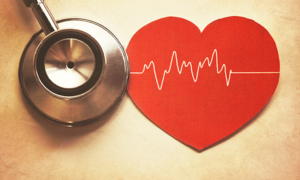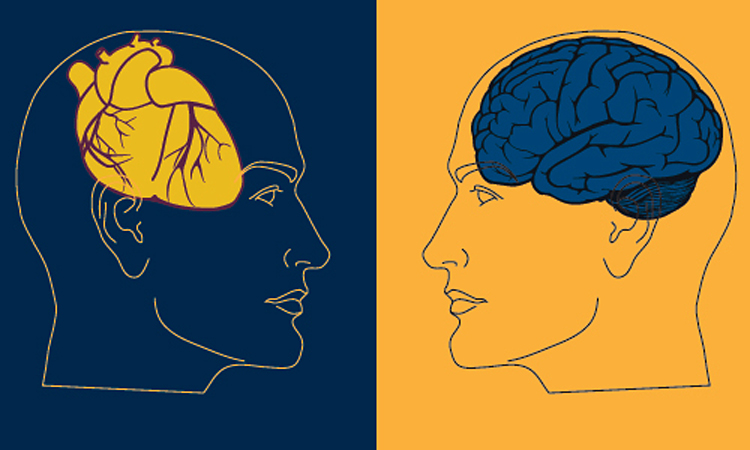We tend to think of our internal organs as specialists, highly refined machines that work 24/7 at specific tasks. The one exception is the brain: the ultimate supercomputer that can make a multitude of decisions and manage our behavior with incredible speed and efficiency.
Now research shows that the brain doesn’t have a monopoly on intelligence. The heart and stomach, for example, are fully equipped to do some thinking of their own. And sometimes they’re giving the brain orders instead of taking them.
The Heart: Not Just Brawn But Brains, Too
Lub-dub. Lub-dub. About 100,000 times a day the heart repeats this monotonous task of survival. But what many think is a mindless pump turns out to have a mind of its own. According to the Institute of HeartMath—a nonprofit research and education organization dedicated to helping people live healthier, happier lives—there are networks of nerve cells (neurons) around the heart that function in much the same way as parts of the brain.
 Back in the 1960s, research conducted by John and Beatrice Lacey—pioneers in the field of psychophysiology—showed that the heart has its own reasoning that is not determined by directives from the brain. Subsequent investigations revealed an actual pathway and mechanism allowing the heart to send messages that inhibit or facilitate electrical activity in the brain. The new field of neurocardiology evolving from this research led to the development of the concept of the “heart brain” in 1991.
Back in the 1960s, research conducted by John and Beatrice Lacey—pioneers in the field of psychophysiology—showed that the heart has its own reasoning that is not determined by directives from the brain. Subsequent investigations revealed an actual pathway and mechanism allowing the heart to send messages that inhibit or facilitate electrical activity in the brain. The new field of neurocardiology evolving from this research led to the development of the concept of the “heart brain” in 1991.
The “heart brain” is equipped with some 40,000 neurons. These neurons can deliver pain signals and other sensations to the autonomic parts of the brain (which are largely unconscious), as well as messages to brain centers involved in conscious thought and emotion. Contact with the “executive” part of the brain can influence perception, decision making, and emotional responses. Studies have shown, for example, that a person is better at recognizing a scary face when observing it as the heart contracts, or pumps blood out to the body, than when observing it as the heart relaxes and takes blood in. Clearly, this type of response can play an important part in survival.
The Institute of HeartMath is exploring possible ways to harness the intelligence of the heart to deal more effectively with stress and to shift the emotional balance toward more positive behaviors. The beat goes on…
When the Stomach Talks, the Brain Listens
 The stomach does a lot more than dump acid on your latest meal. It also fires off signals to the brain via its own extensive network of neurons. According to Michael Gershon, chairman of the Department of Anatomy and Cell Biology at New York–Presbyterian Hospital/Columbia University Medical Center, there are 100 million neurons in this “second brain.” This arsenal far outnumbers the neuron supply in the spinal cord or the rest of the nervous system outside of the brain.
The stomach does a lot more than dump acid on your latest meal. It also fires off signals to the brain via its own extensive network of neurons. According to Michael Gershon, chairman of the Department of Anatomy and Cell Biology at New York–Presbyterian Hospital/Columbia University Medical Center, there are 100 million neurons in this “second brain.” This arsenal far outnumbers the neuron supply in the spinal cord or the rest of the nervous system outside of the brain.
Although not involved in conscious thought or decision making, the stomach brain enables the gut to make its own decisions regarding the behavior of the digestive system. And the stomach has plenty to tell the brain as well. Research shows that about 90% of the fibers in the vagus nerve—the main nerve for the gut—carry information from the gut to the brain.
It turns out that “butterflies” and that “sinking feeling” in the stomach have a neurological basis. Neurons lining the stomach are filled with neurotransmitters, chemicals that help nerve cells communicate with one another. One key neurotransmitter is serotonin, which plays a major role in mood regulation. While serotonin is also found in the brain, 95% of the body’s supply is in the stomach. This abundance explains why drugs like Prozac, known as selective serotonin reuptake inhibitors (SSRIs), help elevate mood by increasing serotonin levels but may also cause stomach disturbances.
Growing interest in the stomach brain has spawned a field of study known as neurogastroenterology, which will likely reveal even more exciting findings about the stomach’s IQ in the future.
Find Out More
- Adam Hadhazy, “How the Gut’s ‘Second Brain’ Influences Mood and Well-Being,” Scientific American.




18 Comments
Lisa
Ed, your article is very interesting – and timely. It seems there is almost no attention being paid to the psychiatric and addictive disorders, that I believe, we are seeing as a result of an epidemic of gastric bypasses. There is surely a price to pay for surgically impairing or removing the body’s natural processes/innate intelligence. Side effects are more profound and damaging than nutrient malabsorption and dumping syndrome.
Michele Rosenthal
Fascinating information, Ed! Goes so far to explain why the body is so very important to consider in terms of how it affects the mind. THE LIVING MATRIX is a terrific movie that underscores many of your points and offers interesting insights into the heart and its effects on the mind, and vice versa. You might enjoy taking a look at the film.
Barbara Botta
Extremely interesting article. Our bodies are fine- tuned-machines. And they know what they’re doing, Thanks Ed Decker. …keep ’em coming.
Rose Caiola
If we could find a way to use heart intelligence to manage stress and influence our emotions, it would change the course of our lives. Never underestimate the power of our heart’s energy and wisdom.
Sandra Wallis
This article is not new but still so up to date and super interesting!! I’m glass I stumbled across this site! So many wonderful articles that are filled with info, not super long and very easy to read!! LOVE LOVE LOVE
Mike
This is something I have never heard before but sounds so right! I have been struggling with stomach pain for years now and I also et chronic migraines I wonder if they could be related?
Max
@Mike, I actually believe that they are related. Everything we consume has an effect on our body. We keep forgetting that our stomach (colon) and head (brain) are deeply connected to one another.
Rose Caiola
Amazing isn’t it.
Arati
This neurons in heart and stomach is evolved ?? Or present from beginning but scientists enable to found? Is this present in all mammals ?
Victoria Rotante
Hi Arati,
Thanks for your comment.
This is believed to have existed before, but science is just identifying the connection now.
Have a Happy New Year!